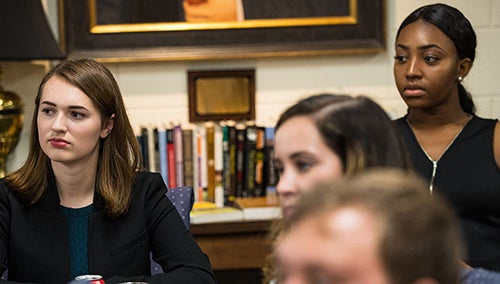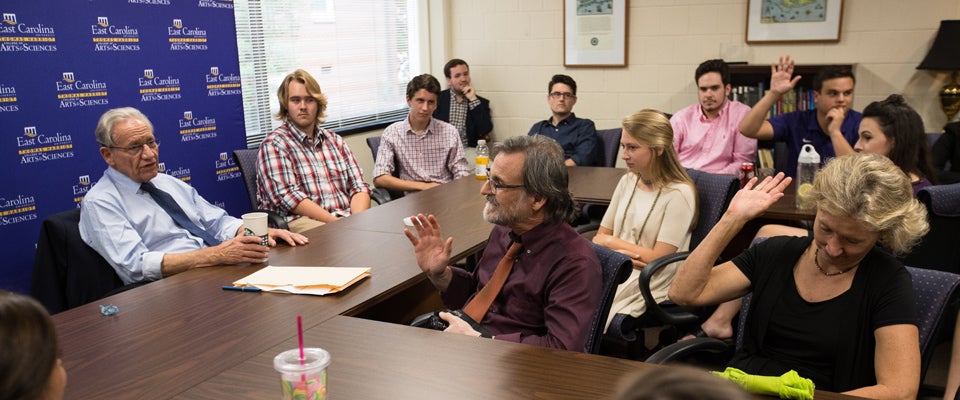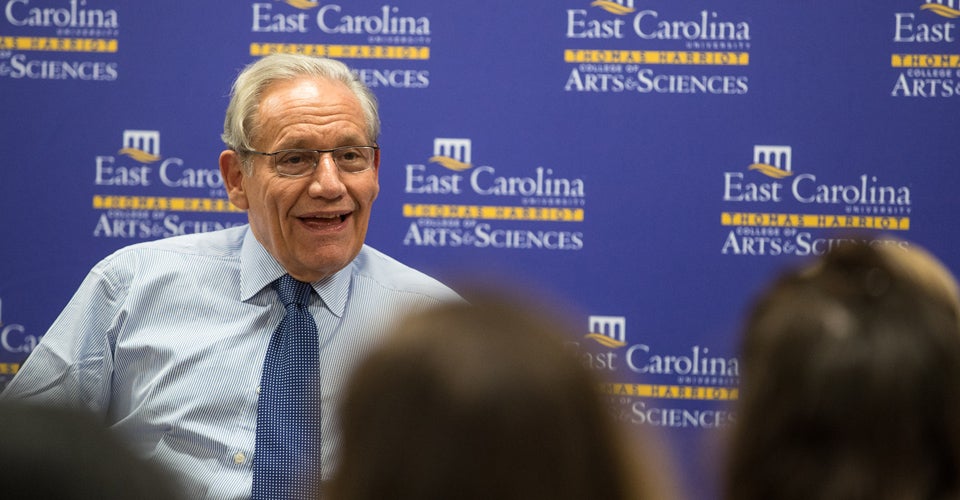JOURNALISTIC ICON
Bob Woodward delivers Voyages of Discovery premiere lecture
Two days after the first debate between U.S. presidential candidates Hillary Clinton and Donald Trump, journalist Bob Woodward asked an East Carolina University audience who would get their vote.
Woodward delivered the premiere lecture Sept. 28 to kick off the 10th year of the Thomas Harriot College of Arts and Sciences Voyages of Discovery Lecture Series.
Most hands in Wright Auditorium went up for Clinton. But Woodward, a 45-year veteran of The Washington Post who has interviewed both candidates, said not to count out Trump, who has resonated with voters as a “lone ranger” outside the conventional political system.
Still, Woodward said there’s more that Americans need to know – specifically Trump’s tax returns and 14,000 Clinton emails discovered on a private server – to make an informed decision Nov. 8. “We don’t want to learn new things when it’s too late,” Woodward said. “It’s going to be an important 40 days.”
Washington Post owner Jeff Bezos has challenged his staff to provide the best election coverage possible, so “that no one can go in the voting booth on Nov. 8 and say they couldn’t find out who these people are,” Woodward said.
Earlier in the day, Woodward met with ECU students and discussed a wide range of topics, from Clinton and Trump and how people get information to government operations and the media. Woodward shared stories from years of covering Washington, D.C., and writing 18 national best-selling, non-fiction books.

ECU students listen as Bob Woodward talks about his 45-year career at The Washington Post.
One of those books, “All the President’s Men,” was co-written with fellow Post reporter Carl Bernstein about the botched 1972 burglary of the Democratic Party headquarters at the Watergate apartment complex. Woodward and Bernstein’s investigative journalism led to President Richard Nixon’s resignation and a Pulitzer Prize for the newspaper.
Known for getting insiders to reveal information, Woodward said he learned to “shut up” and let people talk. He showed students and the Voyages lecture audience a trick he uses by bending one finger painfully into the nail of another finger to remind him to be quiet in interviews.
“Remember, there is always someplace to go and observe, there’s always a piece of paper, and there’s always people to talk to,” Woodward said about sources of information and the importance of fact checking and verification. “Shut up, show up, don’t give up.”
ECU communication major Summer Tillman said she liked the way Woodward used silence to get people to talk. “There’s a psychology to it. People don’t like awkward moments,” Tillman said. “It showed me that there’s not only emotion in silence, but a pressure or heaviness, to make someone speak or tell the truth.”
Mira Sampath, a junior neuroscience and philosophy major in the Honors College, said she attended the event because she has always been interested in current events. That interest was cultivated by her father, who watches several newscasts and reads multiple newspapers each day.
Sampath said she didn’t think many students knew who Woodward was, but after doing research, she wanted to attend. “I liked the fact there was no set topic, it was very open and I wanted to hear his views on current events. His anecdotes were insightful and funny. We got a good glimpse of who he is as a person.”
Tillman added that she was expecting a question-and-answer format, but instead Woodward “turned it on us. It was really thought provoking,” she said.
At the evening lecture, Woodward remembered a North Carolinian, the late Sen. Sam Ervin, who chaired the Senate Watergate committee. He first met Ervin in 1973, when Woodward was 29 and Ervin was 76. Ervin asked for his notes on the Watergate investigation.
“He had those eyebrows that just danced,” Woodward said. “The Ervin committee was the Gold standard. The Ervin committee found the secret Nixon tapes.”
In a final report, Ervin asked why Watergate happened. “It was Nixon and his people and their lust for political power,” Woodward said Ervin wrote.
“I’m proud to have known him,” Woodward said. “Sam Ervin is someone who did big things and laid down a constitutional marker.”
An associate editor at the Post, Woodward has won nearly every American journalism award. Woodward also was the main reporter for the Post’s coverage on the aftermath of the 9/11 terrorist attacks that won the National Affairs Pulitzer Prize.
Chancellor Cecil Staton welcomed the audience, and William M. Downs, dean of the college, introduced Woodward. Jeffrey Johnson, director of the Voyages lecture series, moderated a question-and-answer session following Woodward’s presentation.
During the past 10 years, the Voyages lecture series has welcomed 41 guest speakers and 24,000 students, faculty, staff and community members. More information is at http://www.ecu.edu/voyages.

ECU students studying political science, communication and several other majors talked with award-winning investigative reporter and author Bob Woodward in Bate building on Wednesday.
